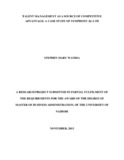| dc.contributor.author | Wandia, Stephen M | |
| dc.date.accessioned | 2013-11-11T09:27:41Z | |
| dc.date.available | 2013-11-11T09:27:41Z | |
| dc.date.issued | 2013-11 | |
| dc.identifier.citation | Degree of Master of Business Administration | en |
| dc.identifier.uri | http://erepository.uonbi.ac.ke:8080/xmlui/handle/123456789/58431 | |
| dc.description | A research project submitted in partial fulfillment of the requirements for the award of the Degree of Master of Business Administration, of the University of Nairobi | en |
| dc.description.abstract | An organization has to respond strategically to environmental factors in order to be sustainable. Quickness to accurate, relevant and precise information is crucial to the success of firms operating in such a competitive environment. An organization human resource capacity is an important source of competitiveness especially if the talent they possess is strategic in nature, inimitable and is rare. Hence in the present day competitive business environment, it is important for a firm to appreciate the critical role this resource can offer in being a source of competitive advantage to the firm and at the same time take actions to manage it.
The study sought to establish the role of talent management as a source of competitive advantage at Symphony (K) Ltd. A case study research design was adopted whereby the researcher interviewed seven senior managers at Symphony who were involved in the strategic process of managing organizational talent. The data was collected through the use of the interview guide that was prepared to guide the researcher and content analysis was used to analyze the data. From the results it appears that the choice of talent management strategy massively affects organisational performance. The findings of the study were that effective talent management affects the financial performance of a firm and this was reflected increased sales revenue over the years since adoption of the strategy, productivity and increased market share. In addition, the product development and innovation registered improvements over the period due to the resultant collaboration in the organization. Inter-department communication has also been enhanced due to the bi-annual meetings on the organization strategy evaluation and adjustment review and this has resulted to increased rate of strategy implementation. Some of the challenges faced in the management of talent in the organization include lack of adequate resources allocated to the process and also coming up with a talent management strategy that is not in conformity with the overall organization strategy. | en |
| dc.language.iso | en | en |
| dc.publisher | University of Nairobi | en |
| dc.title | Talent Management as a Source of Competitive Advantage: a Case Study of Symphony (K) Ltd | en |
| dc.type | Thesis | en |
| local.publisher | School of Business | en |

